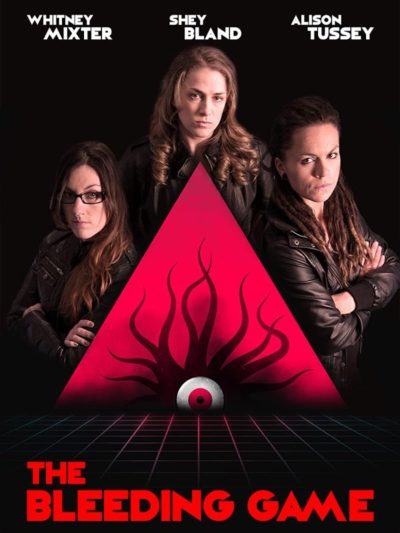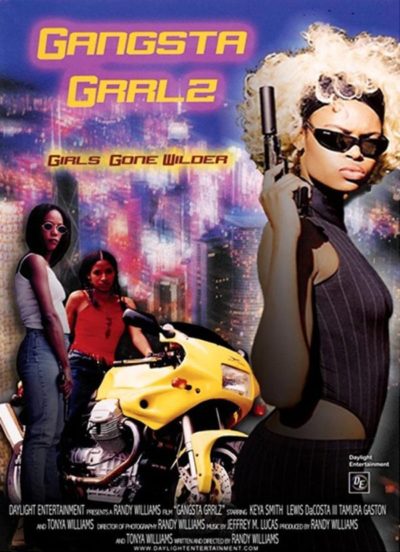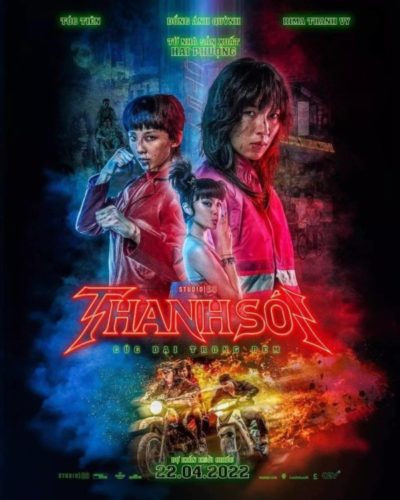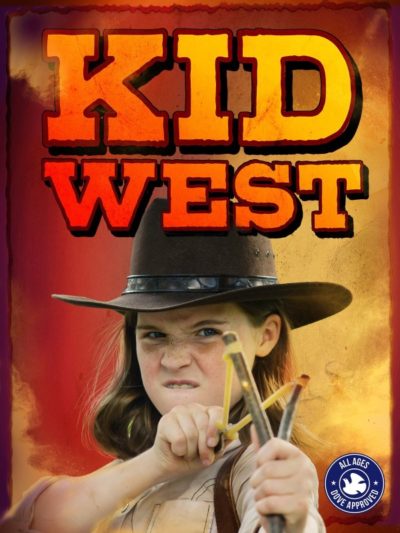★★★½
“Never trust the Jews.”
 The above is said by an Arab character, passing on advice from her father. By the end of it, despite this being an Israeli-produced movie, you may be inclined to agree with them. Mind you, on the basis of this, you should also never trust, the Arabs, Americans or Germans either. This dive into the world of intelligence, counter-intelligence and realpolitik is so morally murky, it should come with a head-lamp, to assist viewers peering into the darkness. Naomi (Riskin) is a Mossad agent, who has been out of the game for two years, since her husband, a fellow spy, was killed in a terrorist attack. She has now been tasked with what should be a simple job, guarding Hezbollah informant Mona (Farahani).
The above is said by an Arab character, passing on advice from her father. By the end of it, despite this being an Israeli-produced movie, you may be inclined to agree with them. Mind you, on the basis of this, you should also never trust, the Arabs, Americans or Germans either. This dive into the world of intelligence, counter-intelligence and realpolitik is so morally murky, it should come with a head-lamp, to assist viewers peering into the darkness. Naomi (Riskin) is a Mossad agent, who has been out of the game for two years, since her husband, a fellow spy, was killed in a terrorist attack. She has now been tasked with what should be a simple job, guarding Hezbollah informant Mona (Farahani).
The latter has just been spirited out of the Middle East, after her cover was blown. Mona had plastic surgery and is recuperating in Hamburg for two weeks, before beginning a new life in Canada. Except, nothing in the world of spydom is ever “simple.” Hezbollah are very keen not to let Mona’s treachery escape unpunished, and Naomi’s nerves are on a knife-edge of perpetual tension, with even a simple wrong number telephone call triggering paranoia. Yet she has every reason to be suspicious. For far above the two women’s heads, wheels are in motion. America want to defeat ISIS, and needs Iran’s help. Iran supports Hezbollah. So if the price of Iran’s co-operation is merely an informant who is no longer of use…
“We take care of our people,” is an oft-repeated mantra, particularly by Naomi’s handler, Gad (Ashkenazi). But by the end, you’ll be feeling it’s more a sick joke than genuine commitment. While he may mean well, his hands are largely tied in terms of actual care. The reality is closer to Spock’s line in Star Trek II: The Wrath of Khan: “The needs of the many outweigh the needs of the few”. Naomi is aware of this, though matters aren’t helped by Mona’s fatalistic approach: “This apartment is cursed,” she mutters at one point. They do inevitably bond, mostly over children: Mona had to leave her son behind, Naomi is trying to conceive via a sperm donor. Though there’s also a makeover session, which is a bit cringey, to be honest – albeit, a makeover session which eventually proves necessary to the plot.
However, when this is simply focusing on screwing up the tension, Riklis does a fine job, creating a world where anyone and everyone is potentially a lethal threat. Hyper-vigilance is an essential trait for survival, since a casual look can be the only warning you get. Yet that way lies inevitable burnout on an overdose of adrenaline. I’m not 100% certain the final twists quite deliver, at least from a logical point of view: I have questions, is all I can say on the topic. Yet they do deliver a satisfactory emotional payoff, and the journey to get there has been fine as well.
Dir: Eran Riklis
Star: Neta Riskin, Golshifteh Farahani, Lior Ashkenazi, Doraid Liddawi





 It is possible to do Lovecraft on a low-budget and make it work. Earlier this year, I was introduced to the delightful films of Lars Henriks, who did
It is possible to do Lovecraft on a low-budget and make it work. Earlier this year, I was introduced to the delightful films of Lars Henriks, who did  Not to be confused with the clearly different
Not to be confused with the clearly different  Well, this is certainly the first film I’ve reviewed here which drops both into the “women in prison”
Well, this is certainly the first film I’ve reviewed here which drops both into the “women in prison”  This is a fairly classic “rise from nowhere” story, yet is well-executed and done in a world which is interesting for its differences. The heroine is – surprise! – Marilia, whom we first meet on the battlefield, about to face an opponent of superior numbers. We then flash back to her childhood, growing up in a Tyracian brothel. Her mother was one of the “painted ladies,” but after she dies, Marilia and her brother Annuweth are on increasingly thin ice. Their effort to run away is unsuccessful, yet does bring them a chance at a new life. While it’s here that Marilia discovers her tactical savvy through board games, it’s not without its downside, the siblings being split up after Marilia enters an arranged marriage in another territory.
This is a fairly classic “rise from nowhere” story, yet is well-executed and done in a world which is interesting for its differences. The heroine is – surprise! – Marilia, whom we first meet on the battlefield, about to face an opponent of superior numbers. We then flash back to her childhood, growing up in a Tyracian brothel. Her mother was one of the “painted ladies,” but after she dies, Marilia and her brother Annuweth are on increasingly thin ice. Their effort to run away is unsuccessful, yet does bring them a chance at a new life. While it’s here that Marilia discovers her tactical savvy through board games, it’s not without its downside, the siblings being split up after Marilia enters an arranged marriage in another territory. This is a prequel of sorts to
This is a prequel of sorts to  This is definitely an interesting idea, and potentially the most meta action heroine film I’ve seen. Cha Yeon-hee (Ahn) has wanted to be a movie heroine ever since she was a child, though it’s an ambition which has always eluded her – in part because of her refusal to work her way up in the industry. She eventually and grudgingly accepts a stunt double position in a historical swordplay film, and shows up on the set for her first day. However, due to circumstances involving a magical clapperboard (hence the title) and an inconvenient portal, she finds herself transported to a parallel dimension. It’s kinda like modern Korea in clothes and speech, but run by warlords and their sword-carrying minions.
This is definitely an interesting idea, and potentially the most meta action heroine film I’ve seen. Cha Yeon-hee (Ahn) has wanted to be a movie heroine ever since she was a child, though it’s an ambition which has always eluded her – in part because of her refusal to work her way up in the industry. She eventually and grudgingly accepts a stunt double position in a historical swordplay film, and shows up on the set for her first day. However, due to circumstances involving a magical clapperboard (hence the title) and an inconvenient portal, she finds herself transported to a parallel dimension. It’s kinda like modern Korea in clothes and speech, but run by warlords and their sword-carrying minions. Made on a shoestring in Ireland, the nicest thing you can say is probably, this doesn’t look as cheap as it was. If only you could say the same for the script, which seems to be trying to be Guy Ritchie, only to end up nearer to Guy Fieri. It’s not a terrible idea, if rather stretching belief. Katelin Ballantine (Doherty) is a film producer, trying to raise funds for her latest movie. To that end, she is hanging out, unwillingly, with sleazeball businessman, Felim Shaw. What she doesn’t know, is he is deep in debt to local mob-boss Edmund Murren (Fleming). He kidnaps them both, forces Katelin to kill her potential investor, then threatens her family to make her continue in her new career as his assassin, alongside former friend and now Murren associate, Henry Furey (Kealy).
Made on a shoestring in Ireland, the nicest thing you can say is probably, this doesn’t look as cheap as it was. If only you could say the same for the script, which seems to be trying to be Guy Ritchie, only to end up nearer to Guy Fieri. It’s not a terrible idea, if rather stretching belief. Katelin Ballantine (Doherty) is a film producer, trying to raise funds for her latest movie. To that end, she is hanging out, unwillingly, with sleazeball businessman, Felim Shaw. What she doesn’t know, is he is deep in debt to local mob-boss Edmund Murren (Fleming). He kidnaps them both, forces Katelin to kill her potential investor, then threatens her family to make her continue in her new career as his assassin, alongside former friend and now Murren associate, Henry Furey (Kealy). I’ve mentioned before the general lack of action-heroine films for the pre-teenage crowd:
I’ve mentioned before the general lack of action-heroine films for the pre-teenage crowd:  Within ten seconds of Chris having entered the room when this was on, she asked, “Are you watching Moonlighting?” No, I wasn’t – but it’s certainly a valid question. Just a couple of years earlier, Shepherd had finished off a run playing a private eye alongside Bruce Wills on that highly successful show. And here she is, again playing a private investigator on television, with a fondness for cracking wise and showing off her legs. What
Within ten seconds of Chris having entered the room when this was on, she asked, “Are you watching Moonlighting?” No, I wasn’t – but it’s certainly a valid question. Just a couple of years earlier, Shepherd had finished off a run playing a private eye alongside Bruce Wills on that highly successful show. And here she is, again playing a private investigator on television, with a fondness for cracking wise and showing off her legs. What